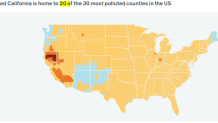How polluted is the air we breathe?
In 2021, 20 of the 30 counties with the highest levels of pollution were in California, according to an air quality report.
The Air Quality Life Index is an annual report that details the impacts of particulate matter around the world. New data is released in the report every year. The report found that South Asia is home to the world's four most polluted countries: Bangladesh, India, Nepal and Pakistan.
Some of its findings might be surprising to some.
Get top local stories in San Diego delivered to you every morning. >Sign up for NBC San Diego's News Headlines newsletter.
The report says that "air pollution remains the greatest external threat to public health," with particulate pollution expected to lower the global average life expectancy by 2.3 years.
"Tobacco use, for instance, reduces global life expectancy by 2.2 years. Child and maternal malnutrition reduces life expectancy by 1.6 years; alcohol use by 7.2 months," according to the research.
According to the report, the 20 most polluted counties in the U.S., which happen to all be in California, were polluted due to the impact of wildfires.
Local
Miguel Zavala Perez, a San Diego State University associate professor of public health, researches the impacts of burning agricultural land in Southern California. He weighed in on the effects of pollution.
"What we are interested in finding out is the chemical composition of those particles," Perez said. "The chemical composition has a lot to do with toxicity."
Perez says the toxicity and length of exposure to pollutants can determine the effects on your health.

The map above shows areas in dark red and orange spread across northern to central California, indicating higher annual averages of particulate matter. San Diego County does not appear to be included in that group.
According to Cal Fire, 2021 had more than 7,000 wildfires and 2.5 million acres burned across the state, with nearly 1 million of those acres from the Dixie Fire in Northern California.
"It’s not surprising when we include these short-term high-polluting episodes that levels, the conditions will abruptly increase at higher levels than other places that don’t have these sort of events," Perez said.
Perez said it can be hard to generalize, but long-term and short-term exposure to pollutants should be considered. In other words, he described these as acute and chronic, which can determine the impact they can have on someone's health.
"When we try to compare air pollution levels between regions, localities or urban areas, it’s important to consider if we’re comparing short-term high pollution episodes or long-term chronic exposure conditions," Perez said.
Michael Greenstone and Christa Hasenkopf, both authors of the study and from the University of Chicago, were not available for interviews on Wednesday.



